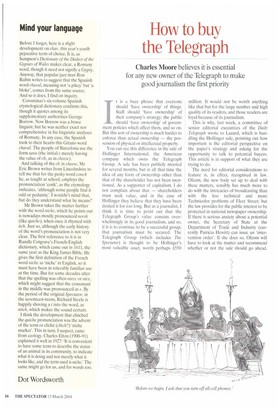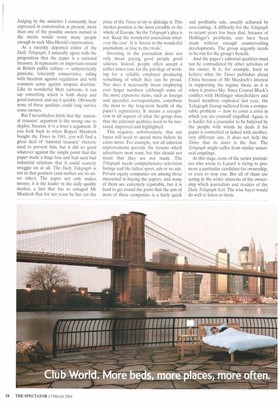How to buy the Telegraph
Charles Moore believes it is essential for any new owner of the Telegraph to make good journalism the first priority
-1t is a buzz phrase that everyone should 'have ownership' of things. Staff should 'have ownership' of their company's strategy; the public should 'have ownership' of government policies which affect them, and so on. But this sort of ownership is much harder to enforce than actual ownership — the possession of physical or intellectual property.
You can see this difference in the sale of Hollinger International, the American company which owns the Telegraph Group. A sale has been publicly mooted for several months, but in all that time the idea of any form of ownership other than that of the shareholder has not been mentioned. As a supporter of capitalism, I do not complain about that — shareholders must seek value, and in the case of Hollinger they believe that they have been denied it for too long. But as a journalist, I think it is time to point out that the Telegraph Group's value consists overwhelmingly in its good journalism, and so, if it is to continue to be a successful group, that journalism must be secured. The Telegraph Group (which includes The Spectator) is thought to be Hollinger's most valuable asset, worth perhaps £550 million. It would not be worth anything like that but for the large number and high quality of its readers, and those readers are loyal because of its journalism.
This is why, last week, a committee of senior editorial executives of the Daily Telegraph wrote to Lazard, which is handling the Hollinger sale, pointing out how important is the editorial perspective on the paper's strategy and asking for the opportunity to talk to potential buyers. This article is in support of what they are trying to do.
The need for editorial considerations to feature is, in effect, recognised in law. Ofcom, the new body set up to deal with these matters, sensibly has much more to do with the intricacies of broadcasting than with the less technical and more Technicolor problems of Fleet Street; but the law provides for the public interest to be protected in national newspaper ownership. If there is serious anxiety about a potential owner, the Secretary of State at the Department of Trade and Industry (currently Patricia Hewitt) can issue an 'intervention order'. If she does so, Ofcom will have to look at the matter and recommend whether or not the sale should go ahead. Judging by the anxieties I constantly hear expressed in conversation at present, more than one of the possible owners named in the media would worry many people enough to seek Miss Hewitt's intervention.
As a recently departed editor of the Daily Telegraph, I naturally agree with the proposition that the paper is a national treasure. It represents an important strand in British public culture — unhysterically patriotic, tolerantly conservative, siding with freedom against regulation and with common sense against utopian doctrine. Like its wonderful Matt cartoons, it can say something which is both sharp and good-natured, and say it quickly. Obviously none of these qualities could long survive some owners.
But I nevertheless think that the 'national treasure' argument is the wrong one to deploy, because it is a loser's argument. If you look back to when Rupert Murdoch bought the Times in 1981, you will find a great deal of 'national treasure' rhetoric used to prevent him, but it did no good whatever against the simple point that the paper made a huge loss and had such bad industrial relations that it could scarcely struggle on at all. The Daily Telegraph is not in that position (and neither are its sister titles). The paper not only makes money; it is the leader in the daily quality market, a fact that has so enraged Mr Murdoch that for ten years he has cut the price of the Times to try to dislodge it. This market position is the most enviable in the whole of Europe. So the Telegraph's plea is not 'Keep the wonderful journalism whatever the cost'. It is 'Invest in the wonderful journalism, or lose to the rivals'.
Investing in the journalism does not only mean paying good people good salaries. Indeed, people often accept a rather lower rate for the privilege of working for a reliable employer producing something of which they can be proud. Nor does it necessarily mean employing ever larger numbers (although some of the more expensive items, such as foreign and specialist correspondents, contribute the most to the long-term health of the paper's reputation). It means a recognition in all aspects of what the group does that the editorial qualities need to be nurtured, improved and highlighted.
This requires, unfortunately, that any buyer will need to spend more before he earns more. For example, not all editorial improvements provide the forums which advertisers most want, but this should not mean that they are not made. The Telegraph needs comprehensive television listings and the fullest sport, ads or no ads. Private equity companies are among those interested in buying the papers, and many of them are extremely reputable, but it is hard to get round the point that the aim of most of these companies is a fairly quick and profitable sale, usually achieved by cost-cutting. A difficulty for the Telegraph in recent years has been that, because of Hollinger's problems, cuts have been made without enough countervailing developments. The group urgently needs to be run for the group's benefit.
And the paper's editorial qualities must not be contradicted by other activities of the owner. It is, for example, hard to believe what the Times publishes about China because of Mr Murdoch's interest in supporting the regime there, as it is when it praises Sky. Since Conrad Black's conflict with Hollinger shareholders and board members exploded last year, the Telegraph Group suffered from a comparable problem — how to cover a crisis in which you are yourself engulfed. Again, it is harder for a journalist to be believed by the people with whom he deals if his paper is controlled or linked with another, very different one. It does not help the Times that its sister is the Sun. The Telegraph might suffer from similar unnatural couplings.
At this stage, none of the senior journalists who wrote to Lazard is trying to promote a particular candidate for ownership, or even to stop one. But all of them are acting in the wider interests of the ownership which journalists and readers of the Daily Telegraph feel. The wise buyer would do well to listen to them.



































































 Previous page
Previous page